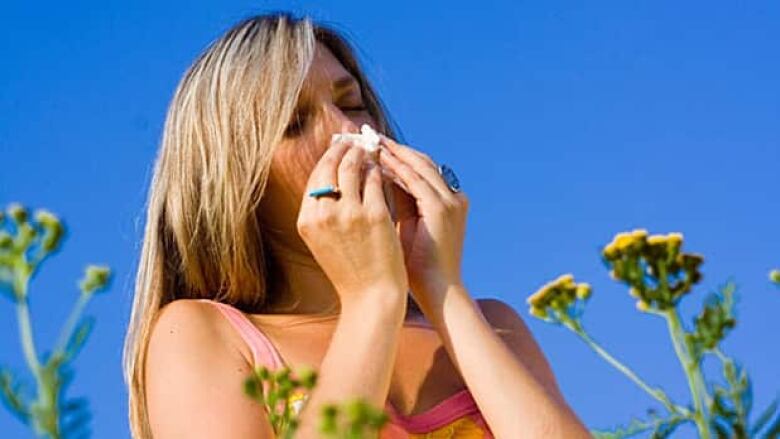Seasonal allergies: Something to sneeze at
Warmer weather brings sneezing and sniffling for millions of Canadians

For millions of Canadians,trees in bud and lawns turning greenis one of those good news/bad news things.
The long, cold slog and all that sniffling and sneezing brought on by a never-ending string of colds going through the office or the kid's school ispast but is beingreplaced by all that miserable sniffling and sneezing triggered by trees and grasses coaxed back to life by ever-milder weather.
More than one in six Canadians suffer from hay fever, or seasonal allergic rhinitis. Depending on what a person is allergic to, allergy season can start in the early spring and last right through to the first killing frost of the autumn. In some parts of the country, you could suffer from March to November.

It's shaping up to be a tough year in 2011 for people with seasonal allergies. David Phillips, a senior climatologist with Environment Canada, said last week that after "a tough winter, it's "looking like a warmer-than-normal summer from coast to coast to coast."
Phillips alsoanticipates it will be dryer than normal across central Canada. That means allergy season islikely tohit hard.
A survey commissioned by pharmaceutical giant Johnson & Johnson suggests as many as 10 million Canadians may suffer allergy symptoms and that more women than men admit to symptoms. The survey also found that 55 per cent of Canadians claim their allergies cut into their productivity and more than a quarter say they'll limit their outdoor time to prevent the onset of symptoms.
The survey found that Ontario suffered the highest rates of seasonal suffering while Atlantic Canada reported the lowest rates.
Here are some frequently asked questions about seasonal allergies and what you can do about them:
Why do I start sneezing as soon as the weather starts warming up?
Blame your parents and your immune system. If both your parents suffered from allergies, there's a 66 per cent chance you will, too. If one parent had allergies, your risk drops but only to 60 per cent.
Reducing your exposure
Besides locking yourself in a hermetically-sealed home, there are steps you can take to reduce your exposure to the stuff that makes you miserable during allergy season:
- Avoid the outdoors when pollen counts are high (especially early morning and late afternoon).
- Change your sheets and pillowcases frequently.
- Consider replacing carpets with hardwood or laminate flooring.
- Make sure your vacuum cleaner uses a hepa filter, which does not recirculate nasty particles back into your home.
- Close your windows and run the air conditioner.
More tips are availablehere.
Your immune system identifies and reacts to different allergens, such as pollen that's blown around by the wind. When an allergen enters the body of someone who is predisposed to allergies, it triggers an immune reaction and the production of allergen-specific antibodies. These antibodies migrate to mast cells lining the nose, eyes and lungs.
The next time a pollen particle drifts into the nose, mast cells release a slew of chemicals (histamines) that irritate and inflame the moist membranes lining the nose and produce the classic symptoms of an allergic reaction scratchy throat, sneezing, itching and watery eyes.
Basically, your body is objecting to the sexual activity of trees (early to mid-spring), grasses (late spring and early summer), and ragweed (late summer until the first frost).
Or you might be sensitive to spores, which are the reproductive particles or seeds of fungi or moulds. Spores can cause even more problems than pollen in some people, because they are smaller and can get deep into the lungs and possibly trigger asthma.
In some cases, people who are allergic to birch and alder pollen can develop oral allergy syndrome. You may have this if you've noticed allergy symptoms after you've eaten an apple, plum, nuts, celery or carrots.
This cross-reactivity is believed to be due to the antigen (allergy-causing protein) structure of the pollen grains and the carbohydrate protein covering of the foods. Cooking or peeling the skin will usually help. That's why some people have trouble eating an apple but have no problem with apple pie.
Am I born with allergies?
Treating your allergies
Over-the-counter antihistamines are the most common drugs used to treat seasonal allergies. The most popular allergy pills no longer leave you drowsy but they can leave your mouth and skin feeling dry.
Nasal sprays and eye drops - many available only by prescription - may also help.
Other treatments include:
- Allergy shots.
- Butterbur: this plant's extract is the only herbal remedy to have undergone widespread clinical trials and to prove as effective as antihistamines.
- Green tea: a Japanese study found that green tea may provide some relief for seasonal allergy sufferers.
More tips are availablehere.
No. You develop them after you are exposed to allergens. It usually happens during your first few years but it can happen anytime - even well into adulthood. Sometimes a child's allergy symptoms will diminish later in life, or even go away completely.
How do I know that my allergy symptoms aren't just a cold?
You can be pretty sure your hacking and sneezing are the result of an allergy if:
- There is no fever and no muscle ache.
- Mucous secretions are clear and runny.
- Sneezes occur in rapid, multiple sequences.
- Your nose, ears and throat (especially the palate or roof of the mouth) are itchy.
- Your symptoms last longer than the seven to 10 days atypical cold usually lasts.
If you're still not convinced, your doctor can perform skin or blood tests to confirm whether you are allergic to something.
Can allergies lead to more severe illnesses?
In some cases, severe allergic symptoms can lead to asthma. Asthma is a chronic inflammatory disease of the airways. The American Academy of Allergy Asthma and Immunology estimates that as many as 38 per cent of people with allergic rhinitis may also have asthma.
In June 2009, Statistics Canada reported that eight per cent of Canadians aged 12 or older said they had been diagnosed with asthma. That rate has been little changed since 2001.
In the population aged 12 to 19, about 11 per cent have asthma. From ages 20 to 64, women had higher asthma rates than men, while there was no significant difference between the sexes in the youngest (12 to 19) and oldest (65 or older) age groups.
Asthma rates are highest in Atlantic Canada and lowest on the Prairies and in British Columbia.
Hospitalization rates for asthma increased for children in the 1980s. By the mid-1990s, the rate had started to decrease but remained higher than the rate in the 1970s.
Asthma kills more than 500 Canadians a year and sends another 150,000 to hospital for treatment.












_(720p).jpg)


 OFFICIAL HD MUSIC VIDEO.jpg)
.jpg)



























































































